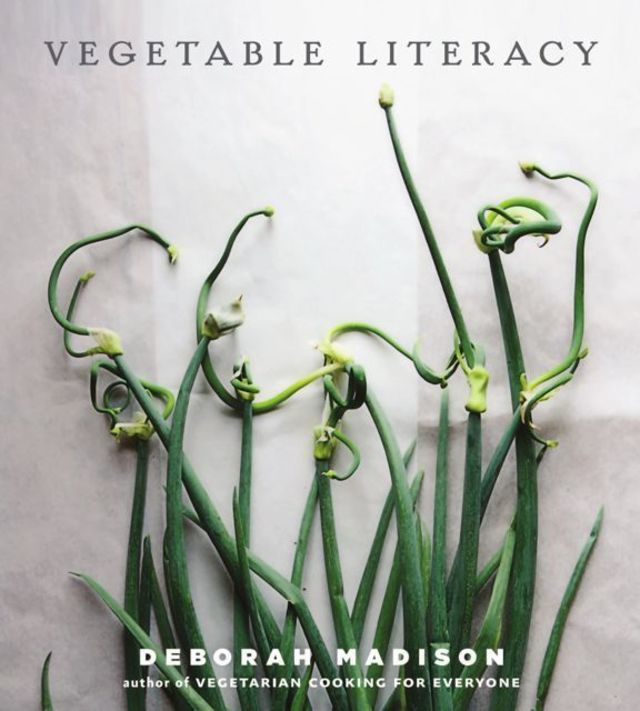Q&A with Legendary Cookbook Author Deborah Madison

Deborah Madison, America’s leading authority on vegetarian cooking and author of the trailblazing Vegetarian Cooking for Everyone and The Greens Cookbook, has done it again.
Her new book Vegetable Literacy: Cooking and Gardening with Twelve Families from the Edible Plant Kingdom (Ten Speed Press) has only just been unleashed onto national bookshelves, but it's already positioned to become a classic.
Madison, whose bonafide slow food resume includes era-defining turns at Chez Panisse and Greens, has inspired multiple generations of home cooks to embrace the colorful world of vegetables, always teaching by example from her kitchens and gardens in Northern California and New Mexico (where she currently resides).
I sat down with the queen of veggies to chat about her new tome, which explores the botanical families of our favorite garden-fresh foods and how members of the same family can often be used interchangeably—with delicious results.
Here, Madison shares more about her personal approach to vegetarianism (spoiler alert: she's not a vegetarian), her love of Oregon's produce, and the vegetables that keep her connected to the seasons, year after year:
It’s probably like being asked to pick your favorite child, but do you have a favorite vegetable family?
It is like picking a favorite child! No, I don't have a singular favorite, but I get intrigued by different families at different times. With rhubarb pushing its fist of leaves up from the ground and sorrel coming on, I'm thinking about the Knotweed family, and with a bit of snow today, how these hearty plants might pare up with another knotweed, buckwheat. It's just the weather for it. In fall, it's the Cucurbits I'm in love with, all the great winter squashes and gourds.
Did you discover any veggie relatives that were truly a surprise?
I think the daisy family, or Asteraceae, was a delightful surprise. The name means "star," and from the same root word we have asterisks (*), asteroids, and, not knowing this, I once wrote a piece about Jerusalem artichokes in bloom and referred to them as "star flowers", which is how they appeared to me. So, on the one hand, you have these fresh, innocent-looking flowers like daisies and sunflowers and asters, but, on the other, these vegetables that tend to be pretty gnarly. They're prickly or bitter or fussy to handle. You've got artichokes and cardoons here, all the chicories, lettuces, burdock root, forgotten roots like salsify and scorzanera, and Jerusalem artichokes. Also safflower. If you break a chicory or lettuce root, all this white latex-sap comes running out and if you taste it, you'll find it's really bitter. You dig up your salsify and it's covered with rootlets. Peel a root and it oxidizes immediately. It's all pretty much trouble, but interesting trouble. I really like this group.
Has your personal approach to vegetarianism evolved over the years?
I haven't been a vegetarian for a long time; I'm too interested in other food issues to narrow myself that much, plus I decided long ago I didn't want the main question I'm asked to be, "Do you get enough protein?" However, I love having a plant-rich diet. My meat consumption is pretty infrequent and I'm really choosy about eating local, grass-fed meat regardless of what it is. I certainly feel best when we're eating lots of vegetables—they're just so delicious, and much more interesting than meat. I'm very happy eating a vegetarian diet, but I've never liked the word that much. It's too much about closing the door, rather than opening it. The idea of vegetarianism has loosened up considerably since I started Greens, and I like that a lot. It can, but doesn't have to be a lifestyle, and if it is, no one cares that much, whereas you used to have to really defend your choices pretty fiercely. There's not quite the same stigma today and that's good.
You mention in your acknowledgments that legendary Oregon farmers Anthony and Carol Boutard have tried to convince you to move to Oregon.
Oh, they've never knowingly tried to convince me to move to Oregon. But every week when I get their e-mail about what's happening at Ayers Creek, and what will be in the market the coming Sunday, I think to myself, "I ought to be living there!" Or, "why am I not THERE instead of in the desert?" I'm so taken by the plants Anthony chooses to grow and I want to be there to experience them. That's pretty convincing! It's all so hard at 7000 feet with no moisture. I just opened my last jar of Carol's Black Raspberry jam so I hope I can replenish my supply when I'm in Portland.
Which seasonal ingredients do you most look forward to once spring has sprung?
Anything green that starts coming up! In my garden, it's the tarragon, chives, lovage, and parsley that first emerge, and the walking onions, which are quite edible. I'm always happy to find the first new garlic, greens of any kind, Victoria rhubarb, and asparagus, which comes fairly late here so you're really ready for it. Really, anything—I'm so ready (and hungry for) local vegetables! Fortunately our farmers are way ahead of the curve with their grow tunnels and such so green stuff has been working its way into the farmers market earlier than ever.
What are you working on now that Vegetable Literacy has been released?
Getting my books organized. Getting the garden cleaned up from the fall. Writing articles and answering e-mails about the book. The book may be done, but it's very much alive and taking lots of time. I have ideas, but it's too soon to talk about them or even do much about them. Got to go back to the well and take a deep drink. Oh yes, and revising Vegetarian Cooking for Everyone - that's been quite a job!




